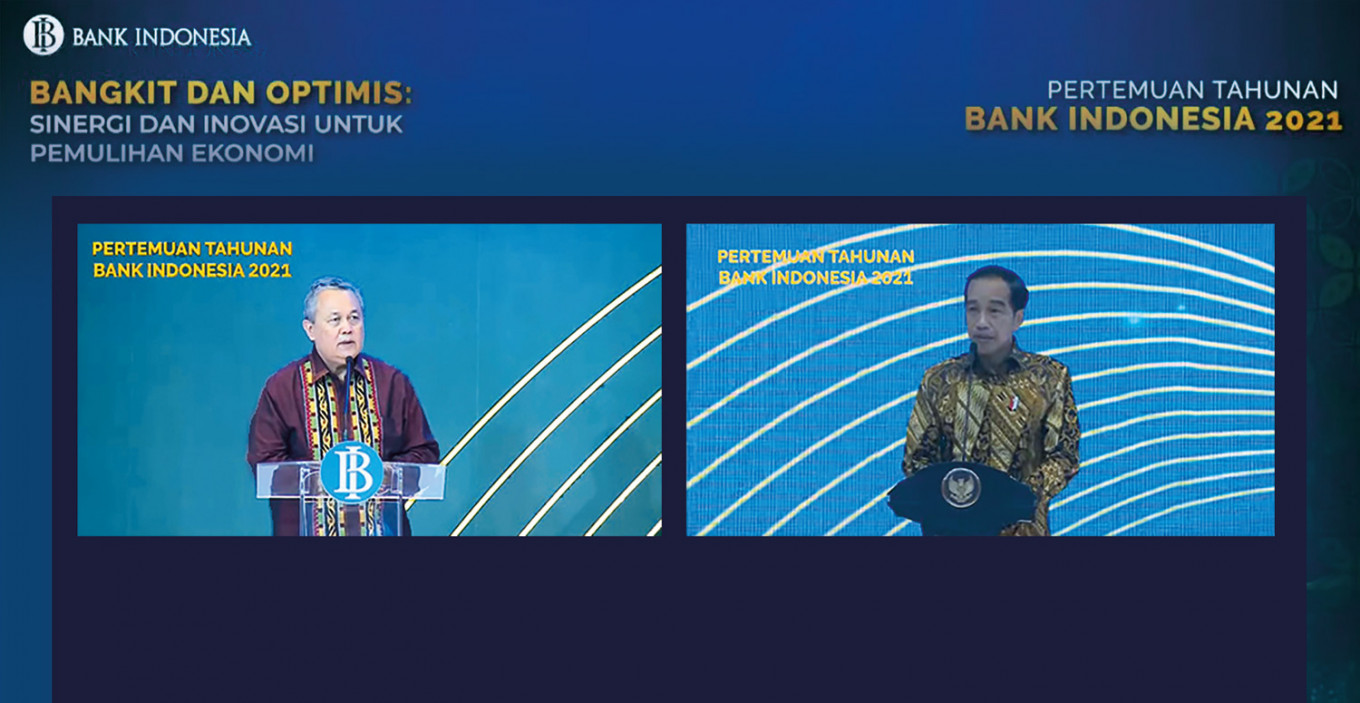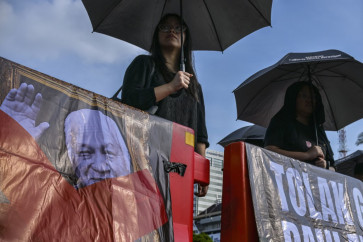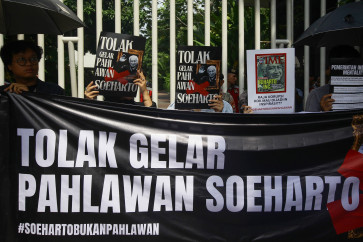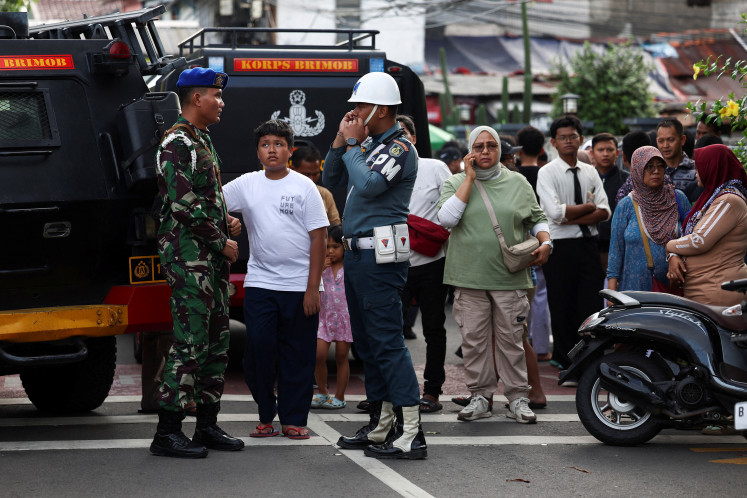Popular Reads
Top Results
Can't find what you're looking for?
View all search resultsPopular Reads
Top Results
Can't find what you're looking for?
View all search resultsSynergy and innovations key to achieving economic recovery in 2022
Change text size
Gift Premium Articles
to Anyone
B
ank Indonesia’s (BI) Annual Meeting held this week underlined the importance of strengthening optimism, alongside building synergy and making innovations to welcome 2022 as the economy has shown signs of improvement over the past few months, ensuring a path toward economic recovery.
BI Governor Perry Warjiyo said a synergy of policies and economic performance in 2021 could be the capital needed to rise up and stay optimistic for a better economic recovery in 2022.
“Strengthening synergy and innovations aims to build mass economic immunity to the COVID-19 pandemic. While the reopening of economic priority sectors has driven short term economic recovery through policy that has generated demand, it has also pushed higher growth for the middle term through structural reform policy,” Perry said during the BI’s Annual Meeting 2021, held in a hybrid format on Nov. 24.
Themed “Rise and Be Optimistic: Sinergy and Innovations for the Economic Recovery”, the BI Annual Meeting highlighted Indonesia’s economic growth prospects as the health crisis begins to subside.
According to Perry, Indonesia’s economy is predicted to grow between 4.7 percent and 5.5 percent, an increase from between 3.2 percent and 4.0 percent in 2021.
The global economic upturn will drive the country’s economic growth as it will have a positive impact on exports and an increase in domestic demand from the surge in consumption and investment. Vaccination drives, the opening of economic sectors and stimulus packages will contribute to the economic rebound in 2022.
According to BI, the low inflation rate will be retained and controlled at 3±1 percent in 2022, supported by a surge in the national production capacity through an increase in efficiency and productivity to meet the hike in demand for aggregation in the economy.
The current account deficit is forecast to be low, between 1.1 and 1.9 percent of the gross domestic product (GDP) in 2022. The stable financial system will be retained, with high adequacy capital and abundant liquidity. Meanwhile, third-party funds and loans will grow between 7 and 9 percent and between 6 and 8 percent respectively in 2022.
The digital economy will grow at a rapid pace. In 2022, the e-commerce transaction value is predicted to reach Rp 530 trillion (US$37 billion), with electronic money recorded at Rp 337 trillion and digital banking recorded at more than Rp 48,000 trillion.
BI will continue with its policy mix, which will be part of the national economic policy direction to accelerate the economic recovery and safeguard economic stability. The policy mix covers five policy instruments, namely momentary policy, macroprudential policy, payment system policy, financial market deepening policy and MSME policy and the sharia economic and finance .
Monetary policy
In response to the risk of increasing pressure of the global financial market stability as a result of the normalization of monetary policy by the United States Federal Reserve System and a number of advanced economies (AEs), BI will focus its monetary policy in 2022 more on stability (pro-stability), either in terms of the inflation rate and the rupiah exchange rate achievement target, or the macroeconomic and financial system stability. “Steps to normalize the monetary policy will be conducted prudently and measurably so as not to disrupt the national economic recovery process,” Perry said.
The four other policy instruments in 2022 will be part of collaborative efforts to accelerate national economic recovery (pro-growth), according to Perry.
Macroprudential policy
BI will continue to ease macroprudential policy and will even expand it to drive banking loans and financing for priority sectors and financial systems, as well as to develop the green economy and finance.
Digitalization of payment systems will continue to be expanded to accelerate the national digital economy and finance by, among others, strengthening industrial consolidation and developing modern payment system infrastructures, notably QRIS, SNAP and BI-Fast.
QRIS will be expanded and targeted to an additional 15 million users, and collaboration on intercountry QRIS will also be further developed. Meanwhile, BI-Fast will be expanded to the entire bank network to serve real time 24/7 retail transactions for the people.
BI also advocates for the electronification of financial transactions at the regional administration level, social assistance (bansos) government-to-person (G2P) 4.0, transportation payment methods and the digitalization of MSMEs and tourism.
Financial market deepening policy
BI will accelerate the depth of the money market and foreign exchange market in accordance with the 2025 money market deepening blueprint (BPPU 2025) to strengthen the effectiveness of policy transmission, the development of modern and international standard money market infrastructure and the development of financing instruments, including the development of sustainable finance.
MSME policy and the sharia economy and finance
Efforts will continue to further expand initiatives to develop an inclusive economy and finance that involve MSMEs and sharia economy and finance, including through the digitalization and expansion of domestic and export market access.
BI’s Annual Meeting was attended by President Joko “Jokowi” Widodo, chiefs of the People’s Consultative Assembly (MPR), chiefs of the House of Representatives (DPR), chiefs and members of Commission XI overseeing finance and banking, heads of state agencies, including the Supreme Audit Agency (BPK), working cabinet ministers, governors and regents/majors, chiefs of banking and non- bank corporations, economists, mass media and representatives of a number of international agencies.
President Jokowi was also of the view that being optimistic was crucial to welcoming in 2022 while emphasizing the importance of staying prudent given the uncertainties that could happen anytime.
The economic sectors will be opened in stages, according to the President. “If a sector has the opportunity to be opened, then please open it, but you must adhere to the health protocols. If you are eager to organize a big event, please do it, but make sure that a taskforce will accompany [the event]. We must be completely prudent,” Jokowi said.
The rapid spread of the COVID-19 Delta variant in the third quarter of 2021 prompted the government to impose the emergency public activity restrictions (PPKM Darurat) for the whole month, which caused the economic decline. “But now, economic activities have started to move on,” said the President.
“The consumer confidence index has returned to normal, the like pre-pandemic levels. The retail and sales index have also started to crawl up and strengthen in line with the ease of mobility. Based on these figures, we can see what the prospects for 2022 look like,” he said.
From the production side, the President revealed that Indonesia’s manufacturing Purchasing Manager’s Index was recorded at 57.2, higher than that in the pre-pandemic period, when it was 51. “This means increasing demand, and manufactures, factories and industries must engage in production. This 57.2 is a high figure so factories and industries must see good prospects with the growing demand,” he said.
President Jokowi expressed his gratitude to Bank Indonesia, the Finance Ministry, the Financial Services Authority (OJK) and the Indonesian Deposit Insurance Corporation (LPS) for their good communication.
“They complement each other. Whenever they found a small problem, they could immediately solve it. These prudent steps must continue as uncertainty occurs everywhere, which is difficult to measure and calculate. But the key is how to control the pandemic in our country because the problem becomes increasingly complex,” he noted.
At the event, BI also presented the 2021 Bank Indonesia Awards to 57 stakeholders, both individuals and groups, as a symbol of BI’s appreciation for their support in carrying out BI’s tasks. The awards also reflected BI’s synergy with its stakeholders and with the government, OJK and LPS in accelerating the national economic recovery.
BI’s annual meeting held at the end of the each year aims to deliver the central bank’s view about the latest economic conditions, challenges, future prospect and its policy direction as part of the public accountability, with the President giving directions.










